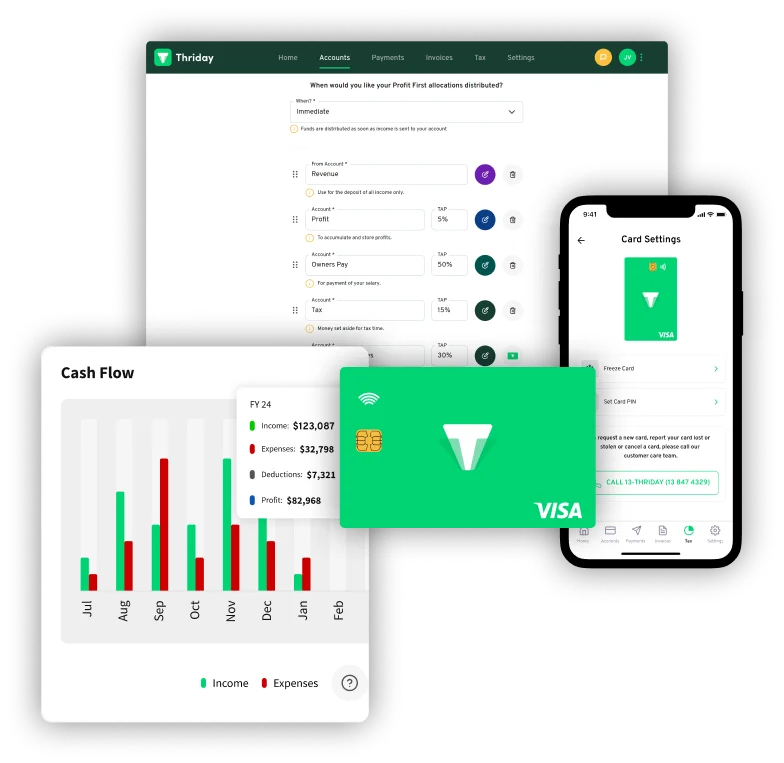What Can I Claim on Tax Without Receipts
When claiming deductions during the financial year, of course, you want to minimise tax, but to avoid a lot of stress, you also want to play by the Australian Taxation Office (ATO) rules. While receipts are the best way to prove your business expenses, you might not have them in some situations. Let's break down what you can claim on your tax return in Australia, even without receipts.

The difference the difference between company tax returns and sole trader tax return
First, we need to understand the difference between company tax returns and sole trader tax returns
Knowing your business structure is critical to checking tax returns. It dictates which forms to use (sole trader vs company require different ones). It also separates business from personal income, which is crucial for accurate reporting.
Different structures have different tax implications (company tax vs individual income tax). Hence, business structure guides you through the return process, reducing errors and ensuring you claim all the deductions you are entitled to.
The critical difference between a sole trader and a company regarding tax returns is that a sole trader includes their business income and expenses in their personal tax return. In contrast, a company must lodge a separate tax return for the business entity.
A sole trader is taxed at individual income tax rates, with a tax-free threshold of $18,200 in the 2019-20 financial year. In contrast, a company pays tax at the total company tax rate of 30%, with different rates applying to companies that are base rate entities that pay 25%. Companies do not have a tax-free threshold and pay tax on every dollar they earn.
Lodging tax returns also differs between the two structures. A sole trader lodges an individual tax return each year, while a company must lodge a company tax return each year. Company tax returns must show taxable income, tax offsets and credits, PAYG instalments, and the tax payable or refundable amount based on the income figures.
Because a sole trader tax return is also a personal tax return, you can claim up to $300 without receipts.
Companies can only actually claim something with proof of the expense. This doesn't necessarily mean you need a 'receipt' though. Let me explain...
Proof is King
The ATO loves receipts! Keeping clear documentation of your business expenses is crucial to ensure your deductions are valid. This includes invoices, bank statements, and other paperwork proving your business paid for the expense. The ATO relies on this evidence to verify your claims, so good recordkeeping is essential.
Thriday steps in to make expense recordkeeping a breeze. With its user-friendly app, you can say goodbye to paper clutter. Snap and save a photo of your receipt on your phone, and you have an ongoing audit trail.
Thriday then works its magic behind the scenes, automatically matching those receipts to corresponding transactions in your bank account. This saves you countless hours of manual data entry and ensures all your expenses are meticulously organised.
By effortlessly categorising your expenses, Thriday makes everything easy to find when it's time for reporting and tax filing. With Thriday by your side, you'll have all the proof you need to claim every eligible deduction, maximising your tax return and keeping the ATO happy.

What can I claim without receipts?
The ATO understands that sometimes receipts aren't available, but as mentioned above, you always need proof that the expense was incurred. Here's what you can claim without them:
- Day-to-day expenses. Rent, utilities, office supplies, marketing costs, and even internet bills – if used for business, they're potentially deductible.
- Inventory and services. The products you sell and the services you outsource to run your business can be deducted.
- Capital allowances. Many business assets decline in value over time. This is called depreciation, and you can claim a deduction for this decline in your tax return. Depreciable assets include but are not limited to machinery, equipment, and tools used in your business (EFTPOS machines, computers, printers, motor vehicles, furniture and office equipment and leasehold improvements (but not the land itself).
Learn more about what you can claim here: https://www.ato.gov.au/businesses-and-organisations/income-deductions-and-concessions/income-and-deductions-for-business/deductions
Meanwhile, a business tax deduction is considered valid given these rules are followed:

Business Purpose
The expense must be solely for your business and directly related to generating income. Renovations to your home office might be a grey area, so consult a tax professional for guidance.
Partial use, partial deduction
Track your business mileage and expenses meticulously, as the ATO requires proof to validate deductions for partially used items. Let's say you use your car for business trips and personal errands. In this case, you can only claim a deduction for the portion of the car expenses that were used for business purposes.
This means keeping good records to track how much you drive for business and how much for personal use. The ATO requires documentation to verify your claims, so be sure to hold onto receipts, mileage logs, or any other records that demonstrate the business use of your vehicle.
What CAN'T I claim with or without receipts?
Unfortunately, receipts are crucial for claiming some deductions. Here are some no-go zones:
- Entertaining extravagance. Business lunches with clients are a great way to build relationships, but lavish entertainment isn't tax-deductible. Think working lunches or industry events, not five-star dinners with caviar. Fringe benefits are different, so check with the ATO for specifics. Your receipt will be a good indicator of just how lavish the event was.
- Traffic fines. Speeding tickets and parking fines are a drag, but don't try to deduct them from your tax return. They're considered penalties for breaking the law, not business expenses.
- Private or domestic expenses. Looking after the kids is a full-time job, but childcare fees are a personal expense, not deductible for your business. The same goes for that new wardrobe for your family – business attire you wear solely for work might be a different story, so consult a tax professional for guidance.
- Non-taxable income, non-deductible expenses. If you earned income from a hobby or something outside your core business activities (and it wasn't taxable), any expenses related to earning that income can't be deducted.
Other non-assessable amounts may include betting and gambling wins, gifts or inheritance, GST you have collected, non-assessable non-exempt government grants, prizes and awards not related to your business borrowed money and the money you contributed as the business. - Skipping out on tax obligations. Didn't pay your employees' PAYG withholding tax or report it correctly? Don't even consider claiming deductions for any expenses related to those non-compliant payments.
- Double dipping on GST. The Goods and Services Tax (GST) you pay on business purchases can often be claimed as a credit on your Business Activity Statement (BAS). Refrain from claiming it again as a deduction on your tax return.
- Land and other big-ticket items. Generally, the land your business operates on is considered a capital asset and isn't deductible as an expense. There are exceptions, though, for things like building improvements or specific costs incurred by primary producers.
- Personal services income (PSI) deduction limits. If your business falls under the PSI rules (typically for professionals like consultants, lawyers, or doctors), there might be limitations on the deductions you can claim for certain expenses.
Other things you need to know when claiming your deduction:
- Different rules apply if you pay for something in advance (like a year's internet service). For prepaid expenses over $1,000, where you won't receive everything within a year, you'll need to spread the deduction over the service period.
- When you claim your deduction depends on the type of expense:
- Daily expenses. Office supplies, wages, and other everyday costs are generally deducted in the year you pay for them.
- Investments. Considerable expenses, like equipment or building improvements, are deducted over extended periods. However, a temporary rule allows an immediate deduction for the business portion of eligible assets acquired between 6 October 2020 and 30 June 2023.
- Start-up costs. Depending on the specifics, these expenses might be immediately deductible or claimed over time.
As mentioned, if something is used for personal and business purposes, you can only claim a deduction for the portion used for your business. Here's how to handle some common scenarios:
- Home office: Working from home? You can claim a portion of your rent, utilities, and internet based on the space dedicated to your office and the time you use it for work. Keep track of these percentages for your records. Read more about work-from-home tax deductions here.
Note: This can significantly impact capital gains tax in the future; it's a good idea to get professional advice on situations like this one. - Car expenses: ATO has different methods for calculating car deductions depending on your business type and vehicle. Find the method that works best for you.
The general rule is for other mixed-use expenses: split the cost based on how much you use it for business. Keep good records to justify your calculations.
- ATO allows deductions for repairs, maintenance, and replacements of business equipment, tools, and even your workspace, as long as they're not considered capital expenses (think big-ticket upgrades). This includes painting, fixing leaky pipes, and replacing broken windows. Generally, repairs aim to restore something to its original condition, not significantly improve it. On the other hand, significant renovations or brand-new equipment purchases wouldn't qualify for immediate deductions. These might be claimed under depreciation rules for assets, or capital works property provisions.
How can you make recordkeeping infinitely easier?
Recordkeeping is made easier with Thriday, an AI-powered financial management platform
Typical scenario during tax time – you're faced with a mountain of crumpled receipts – faded, unorganised, and a guaranteed source of stress. Did you buy that stapler for the office or for that weekend craft project? Unclear categorisation means missed deductions.
This is where Thriday comes into play.
Thriday is a revolutionary new tax receipt tool powered by artificial intelligence. Thriday is designed to alleviate the tax season burden by automatically categorising your financial transactions and identifying potential deductions. Say goodbye to losing receipts. Just snap a picture of the receipt with your phone. Thriday captures and stores everything electronically, eliminating the risk of lost receipts.
Its smart AI automatically categorises your expenses, separating business from personal and ensuring everything is organised for easy access. With Thriday, your business expenses are no longer a disorganised mess. You'll have everything neatly categorised and readily available at your fingertips. Join Thriday for free here!

Final Thoughts
In the fast-paced world of entrepreneurship, every moment counts. Tax season doesn't have to be a time of dread and anxiety. With the recent changes in tax regulations and the emergence of powerful tools like Thriday, claiming deductions has become faster and easier than ever before. Trying to claim anything without a receipt is a non-issue.
Embrace technology to streamline your accounting and tax preparations, allowing you to focus on what truly matters.
DISCLAIMER: Team Thrive Pty Ltd ABN 15 637 676 496 (Thriday) is an authorised representative (No.1297601) of Regional Australia Bank ABN 21 087 650 360 AFSL 241167 (Regional Australia Bank). Regional Australia Bank is the issuer of the transaction account and debit card available through Thriday. Any information provided by Thriday is general in nature and does not take into account your personal situation. You should consider whether Thriday is appropriate for you.





.svg)




.svg)

